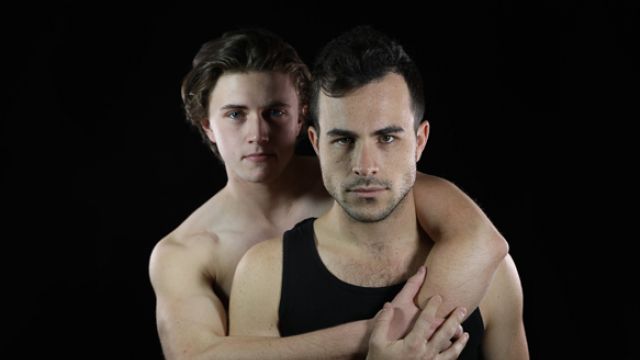Relative Merits
In his program note, director Porter James says he wants to ‘tell [this] story today to continue the education for the younger generation on how far the gay community has come, and how we evolved into the LGBTI community of now’. This production is a revival – and I suspect something of a reworking? – of Barry Lowe’s play first performed in 1993 – and indeed remounted, with cast changes, in 1994, 1996 and as recently as 2013. Since 1993, the world has changed – but perhaps not as much as we might think – or like to think. Although Relative Merits feels, per se, just that bit dated in its dialogue and attitudes, it could almost be set now.
Adam (Samuel Welsh) has left (escaped) the country town where he grew up for the Big Smoke and become a top Rugby League footballer. (Interesting the number of coming out plays about sportsmen – is the stereotype more butch?) His younger, hero-worshipping brother Clay (Isaac Broadbent) arrives unannounced just as Adam is disqualified and sacked for ‘rough play’ – which makes Clay admire his big brother even more. At first, it’s clear that Adam really does not want Clay back in his life. Even with his brother, Adam wants to maintain the media fiction of tough straight guy with glamorous girlfriends. But his blatant violence on the footy field is a blind, a way to disguise the fact that Adam is gay. And Clay, a big hetero cocks-man – with a rather appalling attitude to the ‘chicks’ - refuses to accept that Adam is ‘like that’. He’s still trying to get his head around it when he springs Adam in bed with a lover. Even when reality is unmistakeable, he confides his ambivalent confusion to the audience as Adam lies in a hospital bed, in the first stage of AIDS.
Porter James says he has focussed ‘more about the siblings coming back into each other’s lives and rekindling their brotherly love’. This is a wise choice of emphasis: it is where the strength of the text lies – as well the sad, sad waste of a sportsman and an essentially good man. We see the kind of love young Clay had for his brother change. He has to overcome the ingrained prejudices – and fears – of Aussie male culture to see and love the real Adam. It’s definitely Clay’s story: he’s the one who changes, through love, from loud-mouth butch bloke to someone floating on a strange new current when he goes with Adam to the Mardi Gras. Older brother Adam is the catalyst for Clay’s education. It’s a sincere and heartfelt play even if it’s somewhat clunky and predictable.
Mr Porter makes good use of the very small Butterfly Club stage, extending the playing space out into the audience and convincing us of several changes of location. However, rather less of Isaac Broadbent’s exuberance and shouting would be a good idea; he is just too one-note and big for this space and mistakes volume for emotion and conviction. By contrast, Mr Welsh pitches his Adam towards ‘ordinary’ and matter of fact, making the character’s trajectory all the more moving.
Michael Brindley
Subscribe to our E-Newsletter, buy our latest print edition or find a Performing Arts book at Book Nook.

